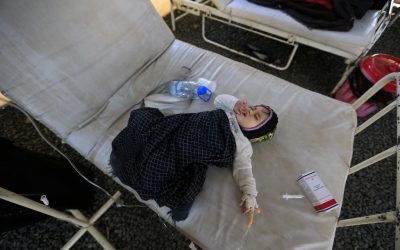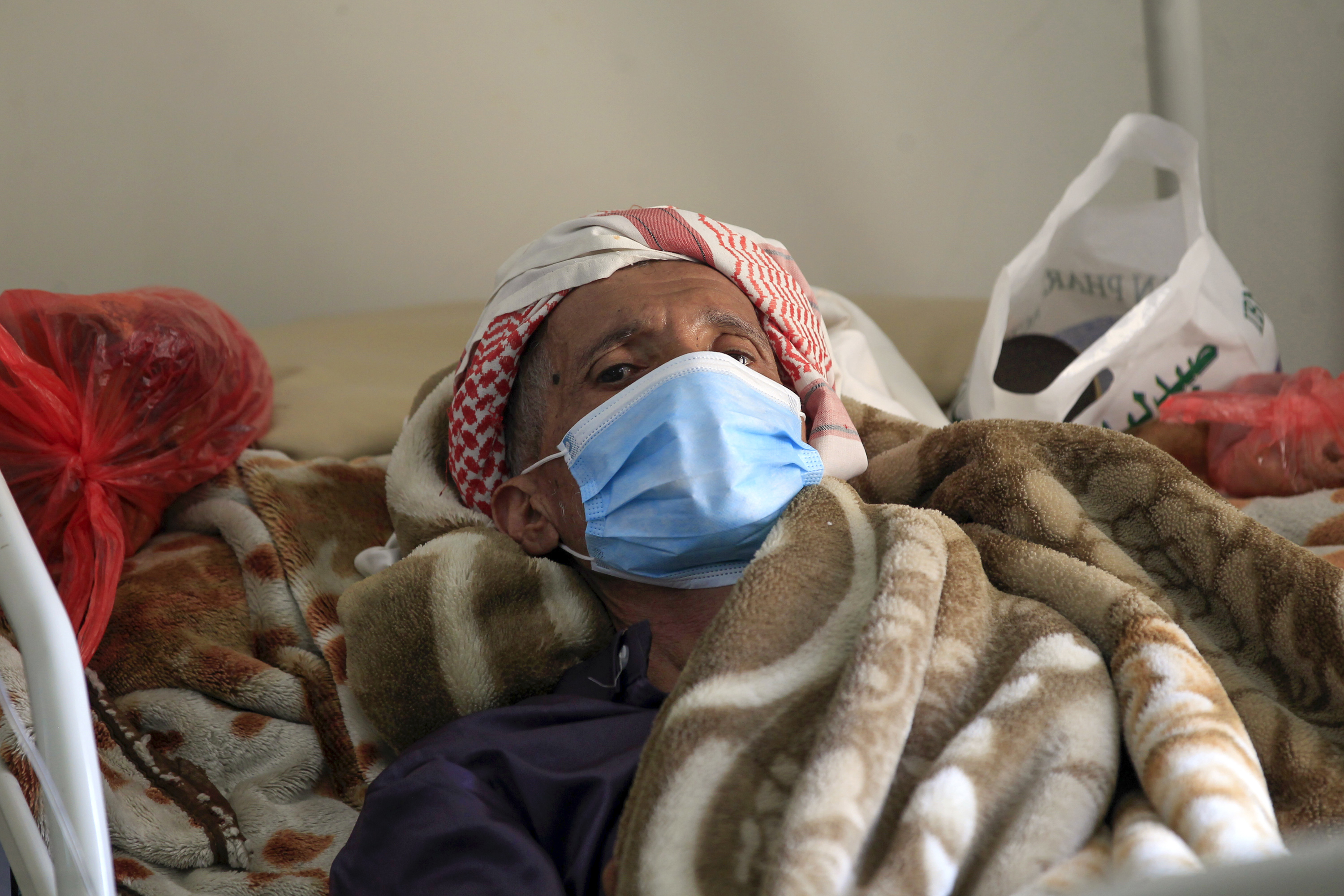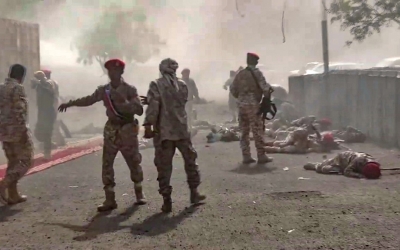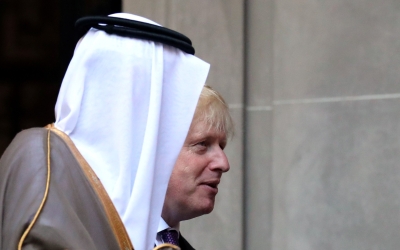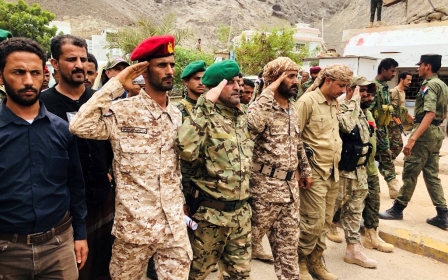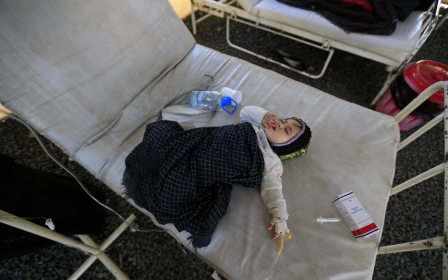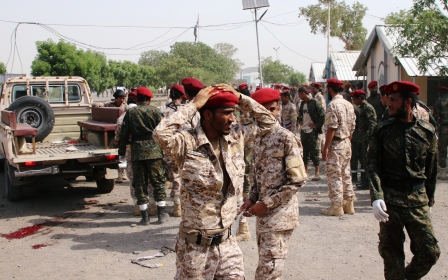Caught between an air blockade and southern suspicion, Yemeni patients are left to die
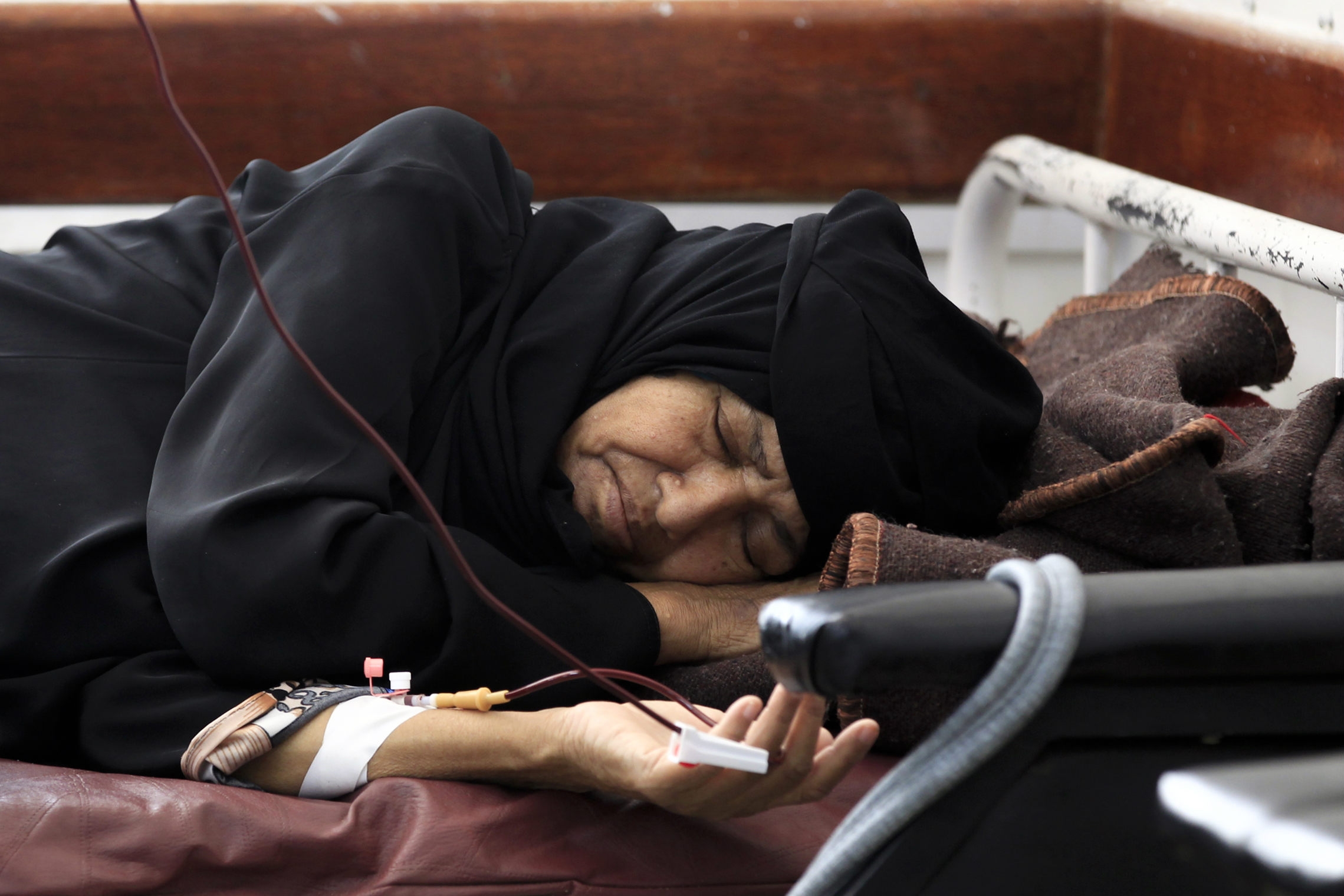
Hussein Saeed, 45, has been suffering from liver cancer for the past year and has tried to receive proper treatment in Sanaa, the Yemeni capital currently held by Houthi rebels, without success.
The Saudi-led coalition battling the Houthis imposed restrictions on Sanaa airport on 9 August 2016, and with no commercial flights able to leave or enter, medicines cannot arrive in the city.
Over the past year, Saeed’s health has declined, and although he has been moved between several hospitals in the capital he has failed to receive proper healthcare.
Having heard of dozens of cancer patients dying in Sanaa, Saeed decided his best option would be to leave the country to receive medical treatment in India, where many other patients have received treatment for the disease.
“I haven't heard of anyone receiving proper cancer treatment in Sanaa, as there are no suitable cancer medicines there and those that are available have been smuggled into Yemen so are not safe," he told Middle East Eye.
New MEE newsletter: Jerusalem Dispatch
Sign up to get the latest insights and analysis on Israel-Palestine, alongside Turkey Unpacked and other MEE newsletters
“There was no option but to leave Yemen for any other country where patients can receive cancer treatment.”
Unfortunately for Saeed, leaving through Sanaa's airport is not an option, and with no Indian embassy in Yemen, getting hold of a visa is severely challenging.
'Better to die than be insulted'
Saeed used to make a living as an electrical engineer, but when he started to suffer from cancer he could no longer work and became dependent on relatives to help him eke out a decent living for him and his family.
Eventually, he decided to travel to Djibouti and apply for a visa from there.
The closure of Sanaa airport means the only option for those in Yemen's north who need medical treatment abroad is to travel by road to the airports in the southern cities of Aden and Sayun, jetting off from there.
Both options present an arduous route that can take 15 to 24 hours, and involve crossing checkpoints and conflict frontlines. In addition to the cost and strain, some choose not to make the journey due to fear of arrest and retribution when they cross from territory controlled by one side to another.
Early on Sunday, Saeed took his bags and travelled towards government-held Aden together with his wife.
"I sold my wife's jewellery and left Sanaa for Aden, because health is more important than possessions,” said Saeed.
“When I arrived at the entrance of al-Dhale province, I found dozens of cars and buses were being stopped by the Security Belt Forces," he added, referring to the Emirati-backed militia controlling the area around Aden.
"Some had patients inside them, who were being prevented from entering Aden because they were northerners.”
Tensions in Yemen's south are sky high.
Last week, two separate attacks on a police station and military parade were claimed by militants and the Houthis, respectively.
A day later, al-Qaeda gunmen killed 19 soldiers in an attack on an army base in southern Yemen, according to security officials.
'I sold my wife's jewellery and left Sanaa for Aden, because health is more important than possessions'
- Hussein Saeed, cancer patient
In response, the Security Belt Forces have begun retaliating against Yemenis travelling from the Houthi-held north.
“Passengers, including myself, remained for a few hours and then returned towards Sanaa as there was no way to get to Aden or Sayun, where the airports are open for civilians to leave," Saeed said.
Despondent, Saeed returned to his home in Sanaa. He is now so pessimistic about getting medical treatment abroad that he has decided not to try again.
“It is better to die at home than to be insulted by the southern forces,” he said.
“The war has deprived us of many things, but healthcare was the biggest loss and there are daily victims.”
'Condemned to a premature death'
In a press release on Monday, the Norwegian Refugee Council (NRC) and the aid organisation CARE International said the three years of restrictions imposed on Yemen’s airspace by the coalition had prevented thousands of sick civilians from seeking urgent medical treatment outside of the country.
“In the three years, as many as 32,000 people may have died prematurely because they were unable to travel abroad for treatment, according to the ministry of health in Sanaa,” said the statement.
Mohammed Abdi, the NRC’s country director in Yemen, said: “As if bullets, bombs and cholera did not kill enough people, the airport closure is condemning thousands more to a premature death.
“There is no justification for preventing very sick civilians from leaving the country to get life-saving medical treatment."
The western-backed, Saudi-led coalition intervened in Yemen in 2015 to try to restore the internationally recognised Yemeni government that was ousted from power in Sanaa by the Houthis in late 2014.
Four years of war have devastated the country’s already fragile health system, with less than half the medical facilities in Yemen fully operational.
Much of the country’s medical equipment, including in Sanaa, is obsolete and urgently needs to be replaced, according to the Houthi-run health ministry in the capital.
An almost complete halt to commercial shipments and medicines through the airport, coupled with the restrictions on imports through Hodeidah port, has caused prices to more than double, making essential medicines unaffordable for most of the population.
'Millions in Yemen are suffering from a lack of access to things that we in most other countries take absolutely for granted'
- Johan Mooij, CARE
The health ministry reports that before the war, around 7,000 Yemenis were travelling abroad from Sanaa International Airport each year for medical treatment not available in Yemen.
Those journeys included treatments for heart, kidney and liver disease, blood conditions, cancer and other long-term health problems.
“People are dying because they cannot do the simplest of things, which is fly from their own airport,” said Johan Mooij, CARE International's country director in Yemen.
“The continued closure of Sanaa airport has become a symbol of a country that is not functioning for its own people.
"Millions in Yemen are suffering from a lack of access to things that we in most other countries take absolutely for granted.
"This must end, and all ports - land, air and sea - must be kept open.”
Obstacles to entering the south
Mohammed Abdullah, in his 50s, is another cancer patient in Sanaa hoping to travel abroad to receive medical treatment. But he believes that it is difficult for weak people like him.
“I am sick and can hardly walk to the bath, let alone the long trip to Aden,” Abdullah told MEE.
“Moreover, it is difficult to get a passport nowadays as the authorities in Aden and Sayun airports reject passports issued by authorities in Sanaa.”
With Sanaa-issued passports now useless in southern airports, Yemenis have to go through the ordeal of getting hold of one issued from Aden or other areas held by the government. The process can take months, even before would-be travellers attempt to get visas.
Abdullah likened the conditions imposed on northerners to a siege.
“Our only sin is that we were born in the north, and this was not in our hands," he said.
"So I call on the international community and the UN to intervene and free Yemenis from the Saudi-led coalition, which imposes this siege on Yemenis.”
Abdullah said that if it wasn't for the unlimited support for the Security Belt Forces by the United Arab Emirates, which is a key member of the coalition, they would not dare prevent Yemenis from entering the south.
“Before the war, we used to travel to Aden normally and go abroad from Sanaa airport for any purpose, but today there is no easy way to go abroad,” Abdullah said.
Earlier this week, Abu Meshal, a Security Belt officer in Aden, confirmed to MEE that the situation in the south is unstable and "allows the security forces to do whatever they believe will secure Aden".
"Many of the northerners in Aden work as spies for the Houthis," he said.
"In 2015, we discovered that many vendors and labourers were spies for the Houthis, and others fought with the Houthis.
"The battles are still ongoing with the Houthis, and exiling suspects from Aden is permissable. The safety of Aden is a priority for us."
While the Security Belt Forces may have some pretext to prevent some northerners from entering the south, Dr Shukri Masoud said the patients are the biggest victims of the air and land blockade.
“Some patients cannot afford the trip from Sanaa to Aden, so they wait for death in their homes. Others who can afford the trip cannot now enter Aden,” he told MEE.
“Patients face many obstacles to travelling abroad, so we hope that the warring parties, and especially the Saudi-led coalition realise the suffering of the patients and open Sanaa airport for commercial flights.”
Saeed, the cancer patient, has the same dream as Masoud and hopes the warring parties reach an agreement over Sanaa airport.
"Opening Sanaa airport is a dire need for civilians, especially patients, so I hope the warring sides reopen it soon,” he said.
Middle East Eye delivers independent and unrivalled coverage and analysis of the Middle East, North Africa and beyond. To learn more about republishing this content and the associated fees, please fill out this form. More about MEE can be found here.


